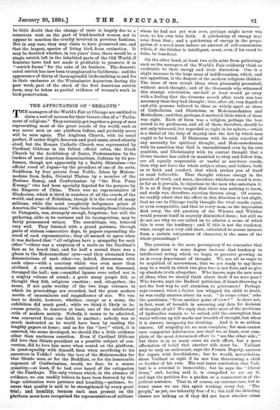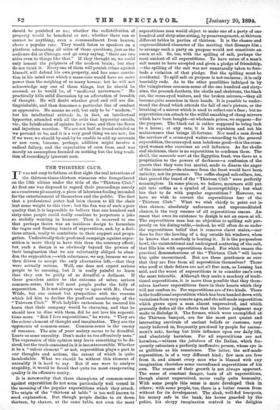THE AFFECTATION OF "BREADTH."
THE managers of the World's Fair at Chicago are entitled to claim a sort of success for their bizarre idea of a " Parlia- ment of religions." They certainly got together a group of men representing most of the great creeds of the world, such as was never seen on one platform before, and probably never will be seen again. The Anglican Church, with its usual perfect, if rather frigid, decorum and good sense, stood silently aloof, but the Roman Catholic Church was represented by Cardinal Gibbons in his fullest official robes, the Greek Church by the Archbishop of Zante, Protestantism by the tleaders of most American denominations, Judaism by its pro- fessors, though not apparently by a Rabbi, Shintoism—the official creed of Japan—by the president of one of its sects, Buddhism by four priests from Yeddo, Islam by Mabom- medans from India, Oriental Theism by a member of the Brahmo Somaj, and Confucianism by "the Hon. Pang Kwang," who had been specially deputed for the purpose by the Emperor of China. There was no representative of Hindooism, which is third in numbers of all the creeds of the world, and none of Fetishism, though it is the creed of many millions, while the most completely indigenous priest of America, the "medicine-man," who leads worship from Colorado to Patagonia, was, strangely enough, forgotten; but still the gathering, alike in its vastness and its incongruities, may be fairly pronounced unique. The asseniblage, too, behaved .very well. They listened with a grand patience, through parts of sixteen consecutive days, to papers expounding the creed of each representative; they all seemed to agree when it was declared that "all religions have a sympathy for each other "—there was a suspicion of a smile on the Cardinal's face as he heard that, and for half a second there was a gleam in the M.ahommedans' eyes—and they abstained from denunciations of each other—or, indeed, discussions with each other—with a courtesy which was even more than civilised. A crowd, sometimes estimated at ten thousand, thronged the hall; non-committal hymns were rolled out in a mighty volume of sound ; a great many people felt, or thought they felt, religions emotion ; and, altogether, the scene, if not quite worthy of the two huge volumes in which its proceedings are recorded, had the great modern merits of unusualness and magnificence of size. We ven- ture to doubt, however, whether, except as a scene, the exhibition did much good ; while we think it likely to in- crease greatly, in America at least, one of the intellectual .evils of modern society. Nobody, it seems to be admitted, was converted from one faith to another; nobody was so .much instructed as he would have been by reading the lengthy papers at home ; and as for the " love " which, it is asserted, the scene developed, we should like a little evidence other than unctuous assertion. Even if Cardinal Gibbons Aid love that Shinto president as a possible subject of con- version, did he love him more when seated on the platform, in quasi-equality with himself, than when sacrificing to his ancestors in Yeddol while the love of the Mahommedan for that Shinto man, or for the Buddhist, or for the honourable exponent of Confucianism, would, we fear, be a minus quantity,—at least, if he had ever heard of the extirpation of the Paathays. The only virtues which, in the absence of evidence, we can readily believe to have been fostered by the huge celebration were patience and humility,—patience, be- cause that quality is said to be strengthened by every great trial; and humility, because each man present on the platform mast have recognised the representatives of millions
whom he had not yet won over, perhaps might never win over, to his own true faith. A quickening of energy may arise from that ; and a quickening of energy in the propa- gation of a creed must induce an amount of self-communion which, if the thinker is intelligent, must, even if his creed be false, be beneficial.
On the other hand, at least two evils arise from gatherings such as the managers of the World's Fair evidently think so creditable to their energy and their discretion. One is a slight increase to the huge mass of indifferentism, which, and not opposition, is the despair of the modern religious thinker. The mass of men accept ideas, when pleasantly presented, without much thought; and of the thousands who witnessed this strange celebration, one-half at least would go away with a feeling that the tiresome search after truth was less necessary than they had thought; that, after all, very dignified and able persons believed in ideas as widely apart as those of Catholicism and Shintoism, or Mahommedanism and Methodism; and that, perhaps, it mattered little which of them was right. Each of them was a religion, perhaps the best suited to its professors, and all of them, therefore, should be not only tolerated, but regarded as right in its sphere,—which is a denial of the duty of inquiry into the law by which man ought to be bound. If Shintoism with its calm rejection of any necessity for spiritual thought, and Mahommedanism with its assertion that God is unconditioned even by his own qualities, and Christianity with its central thought that a divine teacher has called on mankind to obey and follow him, are all equally respectable or useful or nutritive creeds, then why not leave the whole subject alone, and believe, both as to faith and conduct, that which strikes you of itself as most believable. That thought relaxes energy in the pursuit of truth, and must, therefore, whichever creed is true, so far as it prevails, be injurious to the men who entertain it. It is as if they were taught that there was nothing to learn, and study was, therefore, exertion thrown away. Of course, we readily admit that the effect in this direction is but slight, that no one in Chicago really thought the rival creeds equal, or even comparable, and that to every man, as the impression died away, the old question of the Whence and Whither would present itself in scarcely diminished force ; but still we do not see why we are called on to admire a scene of which this is even the tendency ; and if this is not the tendency, what, except as a very odd show, calculated to arouse interest from a certain uniqueness of character, is the sense of the whole proceedings ?
The question is the more peremptory if we remember that the show must in some degree increase that tendency to intellectual acting which we begin to perceive growing on us in every department of thought. We are all so eager to be acquitted of narrowness, that we are ready to say there may be a world in which two plus two is not four, and so give up absolute truth altogether. Who knows, says the new man of ideas, what we should think about theft if we were poor ? Who knows, says the Radical politician, if bomb-throwing is not the best way to call attention to grievances? Perhaps says counsel, when a father has whipped his child to death, he was really anxious about its soul. "is crime crime," asks the questioner, "from another point of view ? " Is there not, in fact, want of breadth in assuming any data for decision of thought of all ? We reply that, while most of the problems of hydraulics remain to be solved, still the assumption that water will run up hill marks not breadth of thought, but when it is sincere, incapacity for thinking. And it is so seldom sincere. Of stupidity let no man complain; for man cannot cure congenital deficiencies; nor shall we, at least, ever com- plain of the most determined effort to "see the other aide;" but there is in so many cases no such effort, but a mere affectation of belief that another side must be. Valliant may be only an enthusiast, says the French Deputy, anxious for repute with freethinkers ; but he would, nevertheless, shoot Vaillant at sight if he saw him threatening a child or brother of his own. His real inner conviction that Vall- iant is a criminal is immovable; but he says the 'liberal thing," and, having said it, is compelled to act on it, and sign the petition for a pardon or a commutation of the judicial sentence. That is, of course, an extreme case, but in lesser cases we see this spirit working every day. "The people," as yet, are tolerably free of it; but half the directing classes are talking as if they did not know whether crime
should be punished or no ; whether the redistribution of property would be beneficial or not; whether there can or cannot be anything, even a commandment from heaven, above a popular vote. They would listen to speakers on a platform advocating all sides of those questions, just as the audience did at Chicago, and go away saying, "there are two sides even to things like that." If they thought so, we could only lament the pulpiness of the modern brain; but they do not think it. Every one of them will punish crime against himself, will defend his own property, and has some convic- tion in his mind over which a mass-vote would have no more power than the neighing of so many horses; but he will not acknowledge any one of those things, lest he should be accused, as he would be, of " mediwval narrowness." He practically kills solid discussion by an affectation Of breadth of thought. He will doubt whether good and evil are dis-. tinguishable, and then denounce a particular line of conduct as oppressive. He means no evil, but only to be " modern; " bat his intellectual attitude is, in fact, an intellectual hypocrisy, attended with all the evils that hypocrisy entails, viz., the falsification of opinion for slime, and then the fierce and injurious reaction. We are not half so broad-minded as we pretend to be, and it is a very good thing we are not; for if we were, we should by-and-by be unable to add up accounts or sow corn, because, perhaps, addition might involve a radical fallacy, and the expectation of corn from seed was merely an assumption founded on nothing but the long tradi- tion of exceedingly ignorant men.



































 Previous page
Previous page